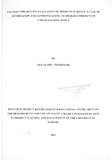| dc.description.abstract | This research set to assess the factors influencing the evaluation of projects in Kenya from a
case of ICT projects in UN, Kenya. The research was set based on a report of UN Office of
Internal Oversight Services (OIOS) in 2013 on role of evaluation and application of
evaluation finding. The choice to conduct the research was based on gaps in actual evaluation
of UN projects in comparison to organization guidance and policy in evaluation. The target
population of the study was UN ICT staff based in Kenya with total number of 98 personnel.
The research objectives were to establish the influence of evaluation budget on the evaluation
of UN ICT projects in Kenya, determine the influence of availability of evaluation material
and network on the evaluation of UN ICT projects in Kenya, assess the influence of
organization members’ competency on the evaluation of UN ICT projects in Kenya, and
assess the influence of awareness on benefit of evaluation among organization members on
the evaluation of UN ICT projects in Kenya. In order to achieve above research objectives,
the study used the stratified random sampling technique in choosing the sample from the
target population. The quantitative questionnaires were used to collect the data. Statistical
Package for Social Sciences (SPSS) software was used to analyze the collected data. Pearson
correlation and multivariate regression model were used to measure the relationship between
dependent variable and a set of independent variables. The findings of the study were that
evaluation budget, availability of evaluation material, availability of evaluation network, the
organization members’ competency, and awareness on benefit of evaluation among
organization members were the key factors influencing evaluation of UN ICT projects at
mean score of 3.55, 4.29, 4.20, 4.57 and 4.18 out of 5.00 full score respectively. The
conclusions of the study were that evaluation budget, availability of evaluation material and
network, the organization members’ competency, and awareness on benefit of evaluation
among organization members significantly influenced the evaluation of UN ICT projects in
Kenya. Among the four influencing factors in the study the UN ICT staff considered
organization members' competency as the highest influencing factor in conducting the UN
ICT projects’ evaluation at 27.62% contribution; while the UN ICT staff considered
evaluation budget as the lowest influencing factor in conducting the UN ICT projects’
evaluation at 21.46% contribution. The study recommended that United Nations in Kenya
should facilitate evaluation after the ICT projects post-implementation, make adequate
budget allocation for ICT projects’ evaluation, facilitate and promote on their association to
evaluation institute, promote the evaluation process, and promote the benefits of evaluation,
its value, and application of the evaluation findings. | en_US |

